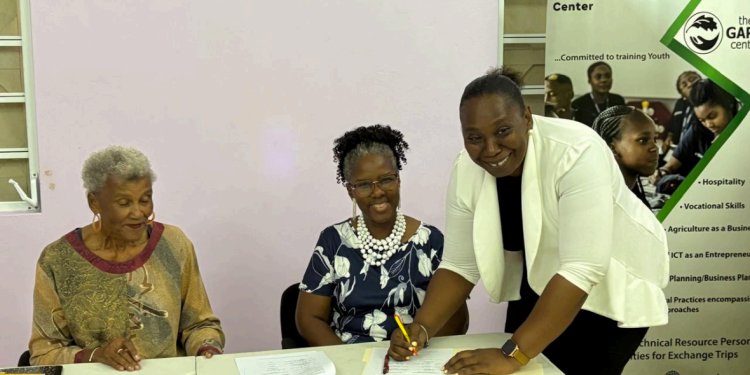The Gilbert Agricultural Rural Development Centre located at Gilberts has launched a project that is aimed at having a lasting impact on the nation’s drive to ensure food security.
Executive Director of the GARD Centre, June Jackson explained that the project is a Global Environment Facility (GEF) Small Grants Programme (SGF) initiative implemented by the United Nations Development Programme under the caption: ‘Scaling up local Food Security through a network of Climate Smart Agricultural Systems’.
“The overall goal of the project is to expand on the recent GEF SGP Project “Increasing food security by reducing the impact of drought and improving security” by increasing the GARD Center’s crop output through the use of climate smart technologies in particular hydroponics that reduces the impact of drought, while increasing vulnerable women, prisoners and agricultural science teachers, students and farm attendants’ capacity about climate smart agricultural approaches,” she further explained.
Jackson disclosed that the overall grant funding of the project is USD$30,000 through the support of GEF SGP UNDP donor partners. The immediate beneficiaries are two neighbouring secondary schools – Pares Secondary and Glanvilles Secondary – inmates of His Majesty’s Prison and vulnerable women who will receive training to operate hydroponics systems as small business ventures.
“The training includes 25 students and 2 Teachers from each school while 12 inmates and 20 vulnerable women will be trained in hydroponics. Each of the women would receive a mini hydroponics box to include a start-up kit with the necessary supplies,” Jackson added.
The project has the support of the Ministry of Agriculture whose Head of Communications, Carol-Faye Bynoe-George described the project as timely and an asset to what the government is striving to achieve which are the accessibility to nutritional food and resilience through sustainable agricultural practices.
Speaking on behalf of the sponsors – GEF SGP and the UNDP, its national Coordinator, Natalya Lawrence noted that as a small-island developing state, Antigua and Barbuda faces challenges such as climate change, import dependence, and limitations on access to arable land. However, it also has the power to transform its food system through innovation, sustainability, and inclusivity.
“One of the most promising solutions is hydroponics — in this instance, a water-based system of farming that uses nutrient-rich water to grow crops efficiently. In a water-scarce country, hydroponics is ideal for Antigua and Barbuda because it requires less space, conserves water and allows year-round production. Further, there is a quicker production cycle with higher yields, good for people who are less patient! To make food security a reality, we must involve our youth and vulnerable groups in these modern agricultural practices,” she remarked.
The representative for HMP’s Rehabilitation Programme, Michaela Harris noted that the project provides the inmates with a ‘very powerful tool’; opportunity. “You have provided not just training, but the promise of a second chance to the individuals who are trying the break the cycle and become better men and women in our communities. The skills that the inmates are acquiring – whether in hydroponics, agriculture or business development – are not just trades; they are tools of transformation,” she declared.
The principals of the two secondary schools – Letitia Lawrence of Pares Secondary and Rody Christopher of Glanvilles Secondary – both expressed their appreciation for being included in the project. “We are deeply grateful for your remarkable generosity and support in making the hydroponics initiative a reality. The construction and installation of a hydroponics unit at our schools, along with the invaluable assistance of teachers, supervisors, volunteers, and participants, are a testament to the power of collaboration and shared vision,” Principal Lawrence stated.


